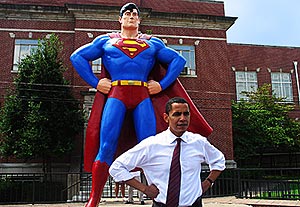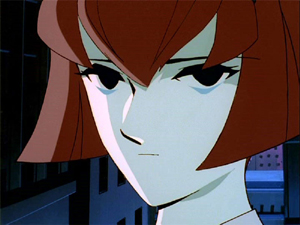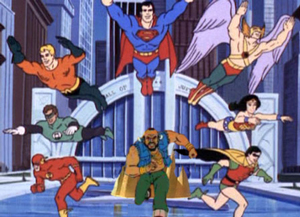Showing 11 - 17 of 17 posts found matching keyword: cartoons
Thursday 26 June 2008
Through complete happenstance while searching modern history for a cartoon as stupid as Marvel's truly wretched animated Iron Man series from 1994, today I discovered a cartoon from 1967 about a super-powered President of the United States straight-forwardly titled Super President. The premise of this cartoon was that President James Norcross was bombarded by cosmic radiation and granted the fantastic ability to modify his body chemistry. Like all good public servants granted amazing powers, President Norcross donned a costume and fought super-villains as Super President. (Calling himself "Super President" may seem like a really bad way to maintain his secret identity, but what would you expect from someone whose job prerequisite depended on name recognition?)
You can't tell it from the clip above, but Super President was voiced by Paul Frees. You may recognize his voice as the narrator of the animated Disney educational film Donald in Mathmagic Land. Or maybe as the voice of the immoral K.A.R.R. on television's Knight Rider. Or maybe as the voice of the sentient supercomputer in the sci-fi feature film Colossus, the Forbin Project. (I think those pretty much sum up my personal stages of development via popular entertainment.) For those of you who prefer your entertainment less math/science oriented, maybe you know Mr. Frees' voice as that of Boris Badenov, the nemesis of Rocky and Bullwinkle.
Anyway, what got me most about Super President is that an acting, elected head-of-state is acting as costumed crime-fighter. Presumably, he can authorize himself to do this, but who's running the country while he's battling space aliens? I would think his term would suffer from a lot of pocket vetoes. And fund-raising would be especially difficult, as, in true comic book fashion, villains would always be stealing from the donated funds, requiring an embarrassing unexplained absence while the candidate looks for an empty bathroom stall to don his tights.
I always figured that despite his moral perfection and unerring ability to make the right choice, Superman could do more good as a freelance policeman rather than a politician because of his unique abilities. Surely, I figured, all that bureaucratic red tape could keep Superman's hands tied. Being a politician means negotiations and diplomacy, two things that I had previously seen as obstacles to getting a job done the Kryptonian way: with super speed. Just being elected requires the super ability to compromise your own beliefs to appease the electorate and the political machines. How can Superman, who is always right and honest, make the necessary campaign promises that will enable his own election? (I don't think the phrase, "never mind that now, Jimmy," is going to work in those confrontational televised debates.)

But maybe I'm wrong; maybe he could do both. If Super President Norcross can pull it off, it should be a walk in the park for Clark "doesn't he look a lot like Superman with glasses" Kent.
(And just in case you're wondering, while Super President may be a bad cartoon, it's still better than Iron Man.)
Comments (0) | Leave a Comment | Tags: cartoons knight rider politics super president superman television
Sunday 6 April 2008
I like the new Spectacular Spider-Man show on WB Kids on Sunday mornings. (It airs just before The [incredibly poorly-written] Legion of Super-Heroes and The [Justice League featuring] Batman cartoons. Who thought of this fanboy line-up?). Yet it really bugs me, pun intended, that when the spider bites Peter, the message "DNA Hacked" appears onscreen. I tell you, radioactive spiders these days are a lot more active than they used to be.
Comments (0) | Leave a Comment | Tags: cartoons computer hacking spiders television
Wednesday 28 November 2007
When I watched A Charlie Brown Christmas as a child, the cartoon was already 20 years old, but the primary sponsor was usually McDonalds pushing Happy Meals to children. Now, 20 years later, most commercials that aired on ABC's seasonal broadcast were pitching cars to adults. I'm not sure what exactly that means or how significant it is, but I don't think I like it. (That's the safe position for me, because I don't like much of anything.)
Comments (0) | Leave a Comment | Tags: advertising cartoons charlie brown christmas holidays television walter
Friday 19 October 2007
I have now seen Transformers, and it sucks. I mean really, really sucks. For many, many reasons. For example, in all promotional advertising Dreamworks presents Optimus Prime's head with a mask over the mouth just as his movie-inspiring toy version has traditionally appeared. However, in the film, Prime has a visible mouth at all times. Why would Dreamworks promote the film showcasing a design that doesn't appear within the film? Answer: because they know that the masked toy-design is much, much better than the design that they actually used. I only mention this because this proves that the in-house marketing department at Dreamworks knows that their film actually sucks. As I previously posted on May 30, even director Michael Bay publicly stated that he thought the movie sucked. So who the hell paid to see this thing in the theater enough times to make it the 3rd highest grossing movie of 2007 to date? That person is the reason that we have capital punishment in America.
But since I think that so many of my recent posts have been so negative as late, instead of a long post about the abundant things about Transformers that make it very, very horrible, instead may I present two things worth watching instead:
1. Bleach on Cartoon Network. Sure, it's animated anime fantasy about super powers and dead samurai sword fights, but isn't that exactly the genre of thing that you'd go to see Transformers for? Great characterization always produces great entertainment. And this show's got it (whether the pronoun "it" here refers to either "characterization" or "entertainment") AND super powered sword fights set to Japanese pop-music. Sweet.
2. Pushing Daisies on ABC. This is the wonderfully narrated fairy tale of one man who has the power to return the dead to life. Naturally, he uses this power to solve murders and complicate his own love life. This show looks like nothing else I've ever seen on TV. It's getting great reviews, but must have a truly staggering production budget (and rumors circulate that director/producer Barry Sonnenfield has gone waaaay over-budget and angered studio execs), so I suspect that it will get the axe as soon as ratings slip even a little. See it while you can.
It suddenly occurs to me that both of those shows circulate around the concept of death. But then, so do CSI (and most other crime dramas), House (and most other medical dramas), and Law & Order (and most other detective shows). So let's not get carried away with calling me a goth, okay?
Comments (0) | Leave a Comment | Tags: bleach cartoons death pushing daisies television transformers
Friday 16 February 2007
I've been watching the Justice League Unlimited cartoons on DVD recently. They really are much better than I used to give them credit for. Their characterization of most characters, no matter how minor, is usually spot-on; ripping comic characters straight from comic books and reproducing them onscreen in vivid detail. Black Canary, Green Arrow, Wildcat... all excellent.
However, there are still several things about their re-imagining of the DC universe that I really don't like. Foremost, I still hate their portrayal of Superman. (He's just not, well, super. Rather than take the Super Friends approach and have Superman be a big idiot, they instead just make him old, weak, and fatigued. That's hardly the approach that the genre-defining character deserves. I think he's the one character that they really get wrong.)
Other nitpicking problems that I have with the show include the premise that their gigantic satellite is run by several hundred regular humans who are treated like nameless grunt employees. (Not only is this not super friendly, it's a logistical nightmare, especially regarding healthcare and insurance.) I regret that Martian Manhunter's role has been reduced to little more than a police shift sergeant. And I also don't care for their inclusion of several redundant, less-than-super heroes. (I mean, what the hell are Vigilante, a sharpshooter with pistols, and Shining Knight, a time lost Arthurian knight with a magic sword, doing on that satellite? What, exactly, do they bring to the team that Batman can't do with Batarangs or Hawkgirl can't do with her Nth metal mace?)
I think most of my complements and complaints can be summed up in one character in particular: the Question.
The character is perfect on the show. Usually while he's onscreen, he's a recreation of the best objectivist/zen aspects granted the character by Ditko & O'Neil, the two writers responsible for the modern character. The JLU breathes life into a philosophically complex, yet uniquely entertaining character. That is the Question!
Yet, the Question is not really a superhero. He is an idealistically philosophical crusader. While he seeks to rout crime, just like his Justice League counterparts, he does it as an exercise to reveal the truth about people, society, and the world-at-large. The Question has an absolute view of the world and the way it is, not the way it should be. Unlike his fellow heroes, he doesn't try to maintain the status quo, he seeks to trim the hypocrisy and corruption of the world and reveal the truth underneath. His radical philosophy (at least in relation to the other heroes in the Justice League) puts him at odds with his teammates and makes him a poor candidate for League membership.
So Justice League Unlimited gets the Question right, but by doing so demonstrates that a lot of its answers are wrong.
Comments (0) | Leave a Comment | Tags: cartoons comic books justice league question television
Wednesday 2 August 2006
Cartoon Network's Adult Swim has recently begun replaying the entire 26 episode anime series Big O at 5 AM EDT. I'd seen a few episodes the last time around, but never from the beginning. And let me tell you, you cannot jump into season 2 halfway through and expect to have any idea what's happening.
Essentially the show is about Roger Smith, an independently wealthy professional negotiator who protects the amnestic futuristic Paradigm City and it's inhabitants. (Though he does frequently destroy more of the city than most protectors would ever dream of. Every time he comes to the rescue in his alter-ego titular giant robot, Big O, he destroys the street and usually several nearby buildings. I guess sometimes you have to break a few eggs to make a Big Omelette.) I really enjoy the show, and I think that it is an exceptionally deep story of the sort rarely tried outside of literature (or Alan Moore's graphic novels).

Roger's two sidekicks are his mustachioed butler, Alfred -- no, wait, Roger's butler is named Norman -- and his android R. Dorothy Wayneright. (Wayneright. I love that. So much about the show, from characters to setting to animation style, is reminiscent of Batman mythology.) To be accurate, Dorothy is not his property but his willing servant. Unlike so many other futuristic stories, in Big O sentient androids are usually treated as free willed, independent beings with rights equal to those of humans.
I'm quite smitten by Dorothy. I find her sensibility, her dry wit, her relative lack of emotion, even her hairstyle very attractive. It figures, I guess, that when I find a girl I like, she's an animated android.
Comments (0) | Leave a Comment | Tags: big o cartoons robots television
Wednesday 21 June 2006
Why wasn't Mr. T ever asked to join the Justice League? He's stronger than Superman, wittier than Aquaman, dresses better than Hawkman, and has more wealth around his neck than Batman has secured in the batcave. And he really, really cared about saving the children.

Not to mention the fact that T had experience in the field of super-heroics. He had his own cartoon and his own group of super gymnasts who fought crime. (Come to think of it, everyone on children's TV of the late 70s/early 80s seemed to have their own crime solving group. It sure seems like TV is telling me that I should be part of a crime solving posse. Or I should be committing crimes for a crime solving posse to solve?)
Clearly the Super Friends could have used the diversity. They let Black Vulcan in just because he had the word "black" in his name. (Apparently, space monkeys didn't qualify as an ethnic minority in the eyes of Uncle Sam's anti-discrimination laws.) Seems to me that Mister T was much more qualified than Black Vulcan.
Comments (0) | Leave a Comment | Tags: cartoons justice league mr t superfriends

